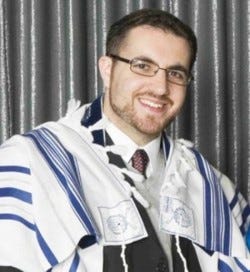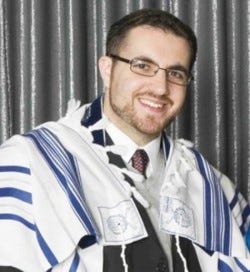Why do so many people think that sexual abuse happens "over there"?
The latest story of a rabbi engaging in sexual abuse reveals some of the misguided --and at times infuriating -- ways that our community deals with abuse in its midst.
Rabbi Jeremy Gerber is a pulpit rabbi, and a sexual predator. He actively pursued a congregant (one that we know of) by encouraging her to have a series of written sexual exchanges with him, followed by an invitation to cheat on her husband and join him sexually in his “open marriage” — all while he was her officially shul rabbi. This is the news that emerged last week — just barely, with this one article in The Forward. Although the Conservative movement had suspended him for this a year earlier, they only announced in October, and significantly, he still retains his pulpit in Philadelphia.
There are many telltale aspects of this story that are already familiar from the dozens of stories of sexually abusive rabbis and religious leaders that have emerged until now. In particular, I would like to highlight some of the the specific tools that he used according to the report, tools that are primarily available to rabbis who are sexual abusers:
Using his rabbinical position for grooming — He abused a relationship of friendship that they had built through working together in the synagogue where she was very active.
Using rabbinical language for charming his way in — He used their working relationship as a pretext to write to her about her personal life.
Using his rabbinical status to gain celebrity — His big job title gained him entrance into places like popular podcasts, where he, by the way, advanced some twisted ideas about sexuality and where the host ignored the fact that he had already been censured.
Using his rabbinical talents of charm and charisma to retain his position — His congregation kept him on because they like the way he performs his public rabbinical duties — sermons, leading services, making eulogies, things like that. This is the curse of charisma that plagues our community, where polished public performance is so often mistaken for virtue and worthiness.
Using his position to keep his power — Even though the Ethics Committee did the job of sanctioning him, and even though the synagogue board heard the whole story, the synagogue kept him in his job. His own history with the congregation was the impetus for the congregation to keep him on.
One lesson here is that people in power flock to other people in power and will do anything to protect each other before risking their own seats.
Maybe this has started to change. It’s possible that what was once the Old Boys Club is fading. Time will tell.Using Jewish language to excuse all this — Misguided use of ideas such as “teshuva” keep abusers in place instead of holding them accountable. Even rabbis. Using words like “teshuva” is just another twisted mind game disguised as Jewish practice.
All abusers use whatever tools they have at their disposal to manipulate their victims. But we need to recognize that rabbis have many tools that other people do not have. As one of my informants told me, when her rabbi asked to come up to her apartment one snowy night for a cup of tea because he “happened to be in the area”, the alarm bells going off in her head were drowned out by the voice of her mother saying, “But he’s the rabbi! You have to respect the rabbi!”
She let him up, he drank the tea, and then he raped her. Because she could not find a way to say “no” to the rabbi.
How do rabbis get away with it?
Another disturbing aspect of this story is the silence of the Conservative movement during recent communal reckonings with abuse. While other corners of the Jewish world have been debating and discussing the abuse in their communities — such as the recent report from the Reform movement or the case of Chaim Walder in the ultra-Orthodox community — the Conservative movement has been completely mum. After they released their brief, vague list of suspended rabbis in October, we have not heard another word from them with details about what these offenders did, how they are being held accountable, or any kind of internal or external reporting. It’s as if they are letting the other movements take the fall for things that are happening in their own backyard as well.
This dynamic reminds me of one the most compelling findings in my research on sexual abuse in the Jewish community: So many people hold the assumption that the problem is somewhere else, in someone else’s community, culture, denomination, or synagogue.
The myth that “It doesn’t happen to us” was echoed by many of my interviewees. “It's a mistake to think you're safer in a Jewish environment.” a woman who I’ll call “Faigy” said, a woman who had been sexually abused by her father throughout her childhood. A woman I’ll call “Nicole”, who was also groomed by her rabbi, said, “I learned the hard way how naïve I’ve been. Our community is not safe from abuse and harassment. We never were. But we feel otherwise.” It can be hard to wrap one’s head around the idea that not only do abusers exist in the Jewish community, but many of them are rabbis.
A more common variation of this denial that I discovered in my research is that instead of “It doesn’t happen in our community” people may replace that with, “It doesn’t happen in our denomination.”
This is Jewish communal denial with a cross-denominational twist.
The Orthodox say sexual abuse happens to non-Orthodox Jews
In the Orthodox community, for example, there is a common misconception that laws of body-cover for women (so-called “modesty” or “tzniut”) and somehow “protect” women and girls from being abused.
Keep reading with a 7-day free trial
Subscribe to The Roar to keep reading this post and get 7 days of free access to the full post archives.




